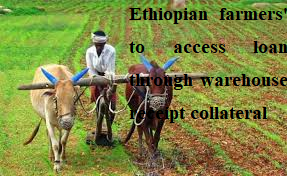
Ethiopia is Africa’s largest barley producer, and there are dozens of beer factories in the country which have high demand of malt for utilizing as inputs. Apart from the absence of malt factories in the country, lack of modern farming methods attributes for the low supply of malt. As the result, most of the breweries meet their demand through importing from abroad and to that end spend huge amount of foreign currency.
The import of malt is confounded by shortage of foreign currency which prevents factories from unleashing their potential to produce beer.
In addition, the imbalance between malt supply and demand has hampered the industries not to fully engage in production. Therefore, to mitigate the problem, raising the nation capacity of currency reserve is essential. On top of that, the government is working jointly with investors to narrow the demand and supply gap. Cognizant of these, malt factory supposed to alleviate the above-mentioned problem is recently inaugurated.
The Soufflet Malt Ethiopia, built by Malteries Soufflet, one of the companies owned by InVivo Group, a French agricultural company, runs the factory.
Soufflet is a family group engaged in food and agricultural production at the international level. It grows barley, wheat and rice and pulses and provides its products for vine growers. It also supplies to the international cereal markets through its trading subsidiary Soufflet Négoce. It is a major operator in the world malt market in Europe, Asia, and South America.
Sufle Malt Ethiopia is the first malt factory in Africa. The factory is located on 10 hectares of land in Bole Lemi Industrial Park and has the capacity to produce 60,000 tons of malt per annum. The factory also plans to enhance its production capacity to 110,000 tons.
The factory secures 75 percent of its inputs from Ethiopian farmers and it not only produces malt for beer production, but also purchases barley from farmers so that, create market linkage for farmers. The factory connected 50,000 barley farmers to the market value chain and supplies 80,000 tons of barley products annually to brewery. It uses latest technology, free of carbon emissions as it uses hydroelectric power which is renewable energy.
Ethiopian Prime Minister Abiy Ahmed (PhD) attended the inauguration ceremony of the factory. He expressed his government’s commitment to create conducive conditions for investors. The new Malt factory is the 28th factory for Invivo group – which is based in France.
“Ethiopia is more suitable for investment than most African countries. Unlike some African countries, land is available cheaply and investors can get electricity at very affordable price. Ethiopia has a sizable number of educated youth with high production potential who can be employed by industries. The country is the second populous in Africa which can be an asset for market and attractive for investment. Therefore, Ethiopia is ready to receive investors who are willing to invest and benefit themselves and the country,” said the Premier.
He further remarked that producers have the potential not only to export their products similar to other countries but also to provide their products to local industries. “We want to see the outcome because we have invested a lot of resources in building industrial parks. The government, for its part, will provide infrastructure for investors”, he added.
Philip Mazin, Chairman of Invivo Group said that Ethiopia has the potential to grow barley.
The factory was built at a cost of 60 million Euros, adding that it plans to support the success of malt production locally in the next two years.
He further said that, the factory is implementing a project to produce inputs and provides local products to the supply chain. It also utilizes locally produced inputs. In such a way it is possible to save 70 percent of hard currency allotted for importation.
The company has spent more than 2 million USD to enhance farmer’s productivity. In this regard, it has provided various supports to more than 50,000 farmers by deploying agricultural and trade professionals. It also worked to build the capacity of producers and increase their direct participation in the production and distribution process and ensure the quality of the products. He explained that linking the farmers to the factory through their products has contributed to the improvement of both the production capacity and the lives of the farmers.
French Ambassador to Ethiopia Remy Marishu on his part said that, the inauguration of the factory is the outcome of successful visit of Ethiopian and French leaders to the two sisterly countries and the project is a sign of good relations between the two countries.
According to the French ambassador to Ethiopia, the two countries have a 125-years old diplomatic relationship and in the past four years in particular, France has been supporting Ethiopia’s economic reforms. French companies are focusing on utilizing domestic resources for their production. It is also interested in investing in Ethiopia’s agricultural sector.
According to some sources, the industrial parks built in Ethiopia are contributing to the growth of the national economy through supplying of products to the market, attracting foreign direct investment, job creation, foreign exchange earnings, market linkages and others. The Bole Lemi Industrial Park, where the Sufle Malt Ethiopia is operating located on 353 hectares of land and has created more than 23,000 jobs for Ethiopian youths through accommodating 13 foreign investors in the first phase of the construction alone. It is an industrial park that has generated over 240 million USD in foreign exchange and exported over 34.5 million USD worth of products to foreign market.
According to Sandokan Debebe, CEO of Industrial Parks Development Corporation, the factory has played crucial role in proxy production. It also exerted efforts to the production improvement process by working with agricultural extension workers, cooperatives and farmers in seed research, supply chain, seed multiplication and crop management. The factory saves more than 50 million USD per annum which would have been spent for importation.
Sanduka further underscored that, the company will focus on creating new products and marketing and eyeing options instead of focusing on a few sectors. He said the main purpose of the industrial parks is to make industries competitive internationally by alleviating the service and infrastructure challenges which the manufacturing faced.
Christophe Passelande, Director of Agriculture, Malt, Vineyards/Green Spaces, InVivo Group, said “50,000 farmers will supply our plant with 80,000 tons of barley per year. Our support is already improving farm yields and connecting farmers to the market, which will have significant impact on local communities,”
Demand for beer in Ethiopia is growing every year. This can be seen in breweries markets. To create a reliable supply for the growing demand, attention must be paid to malt production, which is a major input. It is imperative that Ethiopia, the main producer of the raw material can fill the gap between demand and supply and work tirelessly to that end.
Currently in Ethiopia there are four malt Factories of which two are owned by French multinationals, it was learned.
BY HIZKEL HAILU
The Ethiopian Herald 5 June 2022





